- Home
- Jon Krakauer
Under the Banner of Heaven Page 15
Under the Banner of Heaven Read online
Page 15
Joseph often asserted his belief in the ideal of democracy and in the essential value of the protections codified in the Constitution. But he also believed that democracy and constitutional restraint were rendered moot in his own case, because he had been singled out by the Lord to be His messenger. God spoke through him. Upon Joseph's divine installation as ruler of the world, there would be no further need for democracy because God, for all intents and purposes, would be in charge. Surely, Joseph believed, the American people would understand this once they were given an opportunity to hear his message—the righteousness and undeniable truth of the Mormon faith.
But Joseph's avowed intent to replace the elected government of the United States with a “government of God” was poorly received by the Gentile residents of Hancock County, who didn't fancy becoming subjects of King Joseph Smith. Joseph's non-Mormon neighbors were distressed by the way the Saints voted as a uniform bloc in lockstep with the prophet's instructions, using that leverage to exert inordinate influence in the state government. Freedom of the press, moreover, was taken no less seriously in Hancock County than in the rest of Jacksonian America. When Joseph ordered the destruction of the Nauvoo Expositor, it confirmed a growing fear among non-Mormons that he was a megalomaniacal tyrant who posed a clear and present danger to the peace and stability of the region.
The obliteration of the Expositor had the county's Gentile residents literally up in arms. An editorial published in the nearby town of Warsaw howled, “War and extermination is inevitable! CITIZENS ARISE, ONE AND ALL!!! Can you stand by, and suffer such INFERNAL DEVILS! To ROB men of their property rights, without avenging them? We have no time for comment! Everyman will make his own. LET IT BE WITH POWDER AND BALL!”
The air over Hancock County crackled with hostility. Anticipating imminent retaliation from the Gentiles, on June 18 Joseph declared martial law and mobilized his Mormon army—the five-thousand-man Nauvoo Legion. Fearing the outbreak of civil war, Illinois's governor, Thomas Ford—a fair-minded leader who was not unsympathetic to the Mormons—responded by demanding that Joseph and Hyrum Smith, John Taylor, and others responsible for destroying the press surrender to face charges in Carthage, the Hancock County seat. Governor Ford promised that if the prophet turned himself in, he would personally guarantee Joseph's safety. But, Ford cautioned, “If you, by refusing to submit, make it necessary to call out the militia, I have great fears that your city will be destroyed, and your people many of them exterminated. You know the excitement of the public mind. Do not tempt it too far.”
Joseph replied to Ford, saying he worried that if he and his cohorts were to turn themselves over to non-Mormon authorities, they would be taken “from place to place, from court to court, across creeks and prairies, till some bloodthirsty villain could find his opportunity to shoot us.” Instead of surrendering, in the middle of the night on June 23, Joseph and his brother Hyrum were rowed across the Mississippi by their fearsome bodyguard, Porter Rockwell, where they fled into the wilds of Iowa, intending to make a break for the Rocky Mountains.
A day later, though, while Joseph and Hyrum waited for the delivery of horses to carry them west, Joseph received an impassioned letter from Emma urging him to return to Nauvoo. The messenger who delivered the letter told the prophet that many of the Saints believed he had abandoned them out of cowardice: “You always said if the church would stick to you, you would stick to the church; now trouble comes and you are the first to run.”
Shamed, Joseph returned to Illinois to face prosecution, fearing the worst. “I am going like a lamb to the slaughter,” he warned those who rowed him back across the river.
Joseph and eleven others who were charged with destroying the press surrendered on June 24. As they traveled the twenty-five miles from Nauvoo to Carthage, the roads were lined with Illinois militiamen and other Gentiles who heckled the prophet lustily: “God damn you, Old Joe, we've got you now!”
“Clear the way and let us see old Joe, the prophet of God. He's seen the last of Nauvoo. We'll use him up and kill all the damn Mormons!”
In Carthage, the streets were jammed with armed, inebriated, poorly disciplined members of numerous local militias, all screaming for the prophet's head. Governor Ford, determined to protect Joseph and give him a fair trial, ordered all the militiamen in town to disband except for a single company of Carthage Greys, who were assigned to guard the jail and safeguard the prisoners.
Ten of the Mormons in custody posted bail and were allowed to go free, but Joseph and Hyrum, who had been charged with treason in addition to the less serious crimes charged to the other defendants, were incarcerated in the Carthage jail, a two-story structure with yard-thick walls built from red limestone cut from a local quarry. There were just six rooms in the entire building: two locked cells for holding prisoners, plus four rooms (one of which was a cramped attic garret) that served as living quarters for the jailer, his wife, and their seven children.
Initially the prophet and his brother were held in the downstairs debtors' cell, which was well lit and reasonably comfortable. The jailer, George Stigall, was not Mormon, but he was a decent man, and he worried that this downstairs cell, with its large, ground-level windows, might provide insufficient protection from the enraged men outside who wished to harm his prisoners. So the jailer permitted them to bide their time upstairs in his own bedroom, and friendly visitors were given unrestricted access to the Smith brothers. By this means, two guns were smuggled in to them—a six-shot pepperbox revolver and a single-shot pistol.
Late on the afternoon of June 27, while Joseph and Hyrum were being visited in their quarters by Apostles John Taylor and Willard Richards, approximately 125 militiamen from the virulently anti-Mormon town of Warsaw assembled outside the jail in the damp summer heat. Earlier, in deference to the governor's orders, these Warsaw Dragoons had left Carthage, but they hadn't gone far. They disguised themselves by rubbing gunpowder on their faces and at day's end came storming back into town.
Just seven members of the Carthage Greys were on guard when the Dragoons appeared outside the jail and charged the front entrance. The Greys fired their muskets directly into the mob, but as part of a prearranged plan the guards had loaded their weapons with blanks, so none of the Dragoons was harmed. After discharging their ersatz fusillade, the guards stepped aside, allowing the hate-crazed mob to burst through the front door, firing their guns indiscriminately as they entered; two of their balls came within inches of hitting the jailer's wife.
The militiamen swarmed upstairs and tried to force their way into the bedroom where the prisoners were quartered. Joseph and Hyrum brandished their smuggled weapons while Taylor and Richards each grabbed a walking stick, positioned themselves on either side of the doorway, and began whacking furiously at the mob's muskets as the barrels were poked through the partially opened door.
Two bullets ripped through the door panel; the second one smashed into Hyrum's neck, severing his spinal cord, and he dropped to the floor, dead, where four more balls immediately struck his body. Joseph responded by reaching around the doorjamb and blindly firing all six rounds of his revolver, wounding at least one of the Warsaw Dragoons.
The attackers had succeeded in forcing the door open, however, and a lethal rain of bullets now sprayed into the room. Taylor, in desperation, attempted to jump out of an open window but was shot first in the left thigh and then in the chest; although the latter bullet struck a watch in his vest pocket and therefore wasn't lethal, the impact knocked the wind out of him and sent him sprawling onto the floor. Frantically trying to escape the flying bullets, he crawled under a bed, where another ball tore into his forearm and yet another hit his pelvis, “cutting away a piece of flesh from his left hip as large as a man's hand.”
Seeing no alternative, Joseph also tried to spring from the window, but as he crouched above the sill in silhouette, two shots from inside the room pierced his back and a third bullet, fired from a musket on the ground outside, exploded into his chest. Utteri
ng a plaintive “Oh Lord, my God!” he pitched forward out of the window. The prophet dropped twenty feet, slammed into the earth with a dull thud, and lay motionless, twisted on his left side. A second lieutenant in the Carthage Greys who witnessed Joseph's fall reported that as soon as he hit the ground, he was “shot several times and a bayonet run through him.” After a few moments, another militiaman cautiously approached the body, prodded it, and announced to the crowd that Joe Smith was dead.
Willard Richards, meanwhile, emerged tentatively from behind the door, unharmed except for slight wounds where a ball had grazed his throat and earlobe. When the Dragoons had initially forced their way into the room, Richards was standing on the hinge side of the doorway, and as the door flew open he was inadvertently squeezed between it and the wall. He remained there, standing unnoticed behind the door, until the shooting stopped. After determining that all the militiamen had departed, he left his hiding place and walked to the window. On the ground below he saw “a hundred men near [Joseph's] body, and more coming round the corner of the jail.”
Then Richards noticed John Taylor lying on the floor, awash in his own blood but still breathing. Taylor's watch, struck by the bullet that would otherwise have ended his life, had stopped at sixteen minutes and twenty-six seconds past five o'clock on June 27, 1844. Mormons the world over have committed this time and date to memory, marking the death of their great and beloved prophet. Joseph Smith was thirty-eight years old.
Defying the odds, Taylor survived the grave injuries he sustained in the Carthage jail and later became the church's third president and prophet, succeeding Brigham Young in 1877. Nine years after that, Taylor would receive a notorious, furiously disputed revelation in which God would affirm to him the righteousness of the principle of plural marriage—a revelation that would ultimately give birth to the modern fundamentalist movement, lead to the settlement of Short Creek, and transform the life of Dan Lafferty.
THIRTEEN
THE LAFFERTY BOYS
It should be obvious to any man who is not one himself that the land is overrun with messiahs. . . . It should be a matter of common observation that this clamour of voices represents the really vigorous wing of American religious life. Here is religion in action, and religion actively in the making. . . . The truth is, of course, that the land is simply teeming with faith—that marked credulity that accompanies periods of great religious awakening and seems to be with us a permanent state of mind. By no stretch of the vocabulary could our age be called an age of doubt; it is rather an age of incredible faith.
CHARLES W. FERGUSON,
THE CONFUSION OF TONGUES
After Dan Lafferty read The Peace Maker and resolved to start living the principle of plural marriage, he announced to his wife, Matilda, that he intended to wed her oldest daughter—his stepdaughter. At the last minute, however, he abandoned that plan and instead married a Romanian immigrant named Ann Randak, who took care of some of Robert Redford's horses on a ranch up Spanish Fork Canyon, in the mountains east of the Dream Mine. Ann and Dan had met when he'd borrowed a horse from her to ride in a local parade. She wasn't LDS, says Dan, “but she was open to new experiences. Becoming my plural wife was her idea.” Ann, he adds, “was a lovely girl. I called her my gypsy bride.”
Living according to the strictures laid down in The Peace Maker felt good to Dan—it felt right, as though this really was the way God intended men and women to live. Inspired, Dan sought out other texts about Mormonism as it was practiced in the early years of the church.
It didn't take him long to discover that polygamy wasn't the only divine principle the modern LDS Church had abandoned in its eagerness to be accepted by American society. Dan learned that in the nineteenth century, both Joseph Smith and Brigham Young had preached about the righteousness of a sacred doctrine known as “blood atonement”: certain grievous acts committed against Mormons, as Brigham explained it, could be rectified only if the “sinners have their blood spilt upon the ground.” And Dan learned that Joseph had taught that the laws of God take precedence over the laws of men.
Legal theory was a subject of particular interest to Dan. His curiosity had first been aroused when he was training to be a chiropractor in California, following a run-in he had with state and county authorities. At the time, he supported his family primarily by running a small sandwich business out of their home. Dan, Matilda, and the oldest kids would get out of bed before dawn every morning in order to make and wrap stacks of “all-natural” vegetarian sandwiches, which Dan would then sell to other chiropractic students during the lunch hour.
“It was a very profitable little hustle,” Dan says proudly. “Or it was until the Board of Health closed me down for not following regulations. They claimed I needed a license, and that I wasn't paying the required taxes.” Just before he was put out of business, Matilda had given birth to a baby boy. Money was tight. Losing their main source of income was problematic. It also proved to be a pivotal event in Dan's passage to fundamentalism.
“After they shut me down,” Dan recalls, “I didn't know quite what to do. It didn't seem right to me that the government would penalize me just for being ambitious and trying to support my family—that they would actually force me to go on welfare instead of simply letting me run my little business. It seemed so stupid—the worst kind of government intrusion. In The Book of Mormon, Moroni talks about how all of us have an obligation to make sure we have a good and just government, and when I read that, it really got me going. It made me realize that I needed to start getting involved in political issues. And I saw that when it comes right down to it, you can't really separate political issues from religious issues. They're all tied up together.”
Upon completing his chiropractic training and returning to Utah, Dan went to work as a chiropractor for his father. By then the Lafferty parents had sold their farm and bought a house in the old part of downtown Provo; Dan's father ran his practice out of a basement office in this home. In 1981, shortly after Dan started working for Watson Sr., the LDS Church sent both of the elder Laffertys abroad on a two-year mission, at which point Dan and his younger brother Mark (who had graduated the Los Angeles College of Chiropractic six months after Dan), agreed to take over the practice in their father's absence.
Dan and Mark had always enjoyed each other's company. “As children,” says Dan, “we were inseparable.” Every morning and evening of their childhood they sat together across a milk pail to milk the family cow. They spent their summer vacations practically joined at the hip, “playing in the barns, jumping in the hay, throwing the football, playing in our tree hut,” he recalls. “It's funny to remember how hard it was to stop playing even long enough to get a drink or take a pee. Nothing tasted so good as cold water from the faucet that filled the watering trough, and nothing felt so good as taking a pee when the pressure got so bad we had to stop playing because you couldn't hold it any longer.” When their younger brothers—Tim, Watson Jr., and Allen—were old enough, the smaller boys eagerly joined in Dan and Mark's escapades. Then, says Dan, “we'd all line up along the fence, oldest to youngest, and have a group pee. The little guys loved to do what Mark and I did, especially lining up to pee on a fence.”
When Dan and Mark started working together in their father's office, the special closeness they had shared in their youth was rekindled. During breaks between patients they engaged in heartfelt discussions about everything that was most important to them—and increasingly what seemed most important concerned religious doctrine and its power to remedy the insidious evils inflicted by the government on its citizens.
Regarding the timing of these heart-to-heart talks, Dan reports, “I began to observe a fascinating phenomenon.” Dan and Mark were usually so busy seeing patients that often several days would pass between their religious-political discourses. But on those days when they would unexpectedly have gaps in the schedule in which to talk at length, says Dan, “rather mysteriously, my younger brothers would show up, unannounced. And
we would have some very, very valuable time discussing issues.” These impromptu get-togethers happened often enough, says Dan, “that it seemed like it had to be more than just a coincidence.” Five of the six Lafferty brothers—Dan, Mark, Watson, Tim, and Allen—were usually present for these ad hoc conferences; the only brother who failed to attend was Ron, the eldest of the Lafferty offspring, who was six years older than Dan, and had always acted less like a sibling than a father figure to his brothers.
Dan usually led the discussions, which inevitably described how the government had far exceeded its constitutionally mandated reach and was dangerously out of control. Buttressing his arguments by quoting scripture from The Book of Mormon, he patiently explained to his brothers that the government had no right to require American citizens to obtain any kind of license, or pay taxes, or submit to the oppressive burden of a Social Security number. “I had come to realize,” Dan says, “that a license was simply an agreement with the government to let them have control of your life. And I decided I didn't want them to have control of my life. . . . I already had a basic right to enjoy all of the basic activities of a human being, without their permission.”
Although Dan had not yet allied himself with any established fundamentalist church or prophet, his self-directed studies had transformed him into a de facto Mormon Fundamentalist—and an exceedingly ardent one. The impetus for most fundamentalist movements—whether Mormon, Catholic, Evangelical Christian, Muslim, or Jewish—is a yearning to return to the mythical order and perfection of the original church. Dan Lafferty was moved by this same desire.
The more he studied historical Mormon documents, the more certain Dan became that the LDS Church had blundered off course around 1890, when then-president and prophet Wilford Woodruff was coerced into doing away with the doctrine of plural marriage by the godless government in Washington, D.C. The modern LDS Church, Dan had become convinced, was an elaborate fraud.

 Into the Wild
Into the Wild Into Thin Air
Into Thin Air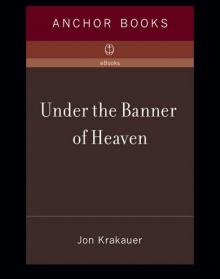 Under the Banner of Heaven: A Story of Violent Faith
Under the Banner of Heaven: A Story of Violent Faith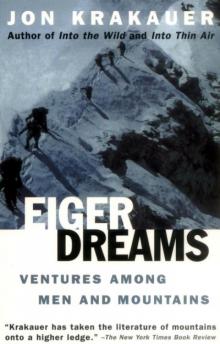 Eiger Dreams: Ventures Among Men and Mountains
Eiger Dreams: Ventures Among Men and Mountains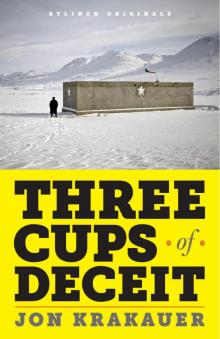 Three Cups of Deceit: How Greg Mortenson, Humanitarian Hero, Lost His Way
Three Cups of Deceit: How Greg Mortenson, Humanitarian Hero, Lost His Way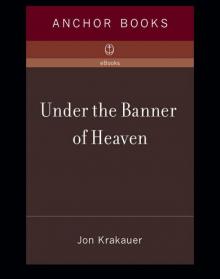 Under the Banner of Heaven
Under the Banner of Heaven Missoula
Missoula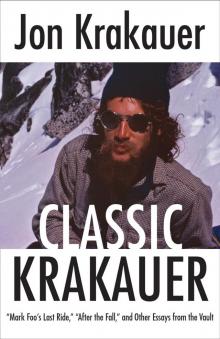 Classic Krakauer
Classic Krakauer